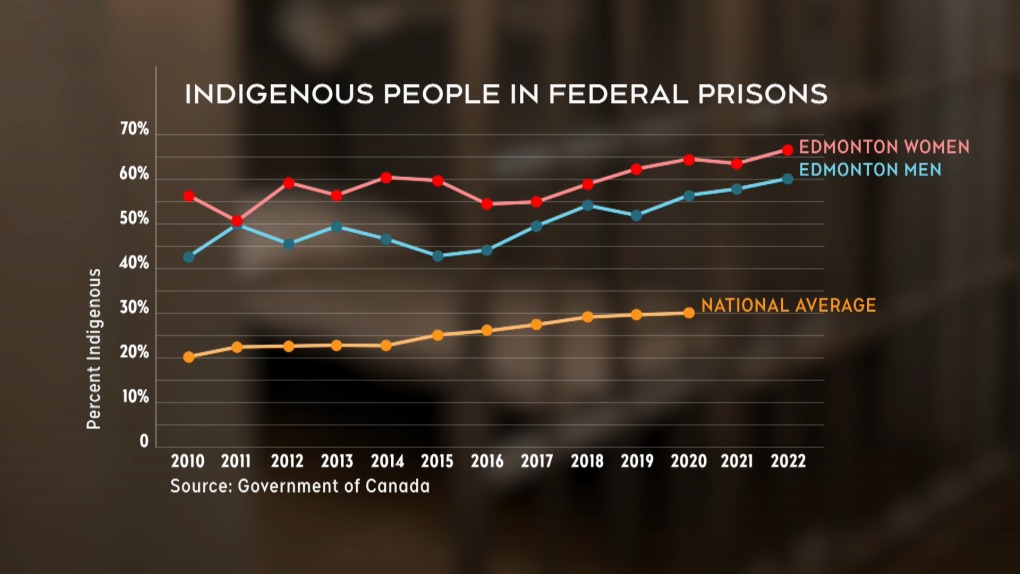'A lot of racism': Percentage of Indigenous inmates in Edmonton hitting new highs
It's not a new trend but the overrepresentation of Indigenous people in Edmonton's prisons is much higher than the Canadian average and continuing to grow at a faster rate, as advocates search for solutions.
CTV News Edmonton obtained statistics from Canada's Office of the Correctional Investigator going back more than a decade.
They show that more than 65 per cent of inmates at the Edmonton Institution for Women this month are Indigenous, up from 56 per cent in 2010.
Nearly 60 per cent of the men incarcerated at Edmonton Institution identify the same, up from 42 per cent in 2010.
About 6.5 per cent of people in Alberta identified as Aboriginal in a 2016 Stats Canada report.
"I don't want to say it's racism, I wish it wasn't, but there's a lot of racism involved in the policing and then secondarily, just the judicial system and the way it's set up," criminal defence lawyer Jill Shiskin explained to CTV News Edmonton.
"The Indigenous people that I end up working with have had really tough lives."
Shishkin believes Indigenous people are over-policed as suspects and under-policed when they're victims.
"It becomes a self-fulfilling prophecy when now that group is charged more often, they're convicted more often," she said.
Also part of the problem, according to a legal navigator who works with Indigenous people, is that the justice system often perpetuates a cycle of imprisonment which usually starts small and then snowballs.
"The courts have not been able to address, were not designed to address, issues of addiction, housing and poverty," said Stephen Shirt with Legal Aid Alberta.
"If we don't address those issues when it is at that stage, where it's just a small drug offence and it's only a couple days, that sentence will grow larger and larger once they start reoffending without those proper supports in place."
The data shows a continual increase in the proportion of Indigenous people in Canadian prisons over the last decade.

The rate is much higher, and also growing faster, in Edmonton's federal prisons.
According to a local researcher, having more autonomy in the justice system would improve outcomes for Indigenous people.
"Non-Indigenous people focus way too much on sort of, 'fixing the problem that Indigenous people have'…As opposed to locating the problems in the systems," said Nancy Van Styvendale, a Native Studies Associate Professor.
She suggests moving away from current colonial justice practices, to more traditional Indigenous ones.
"The colonial justice system was placed over top of those existing Indigenous laws, so (we need to increase) respect for those laws and respect for Indigenous people being able to chart their own path," Van Styvendale said.
The recent creation of specialized courts in Alberta is a good example of that, and Shirt expects those processes will help.
"What's taking place within the Edmonton and Calgary Indigenous Courts, there is a focus on a holistic approach that leads to healing for the person," Shirt said.
There were 258,640 Indigenous people in Alberta, out of a total population of 3,978,145, according to a survey done in 2016.
With files from CTV News Edmonton's Carlyle Fiset and Katie Chamberlain
CTVNews.ca Top Stories

opinion Tom Mulcair: Prime Minister Justin Trudeau's train wreck of a final act
In his latest column for CTVNews.ca, former NDP leader and political analyst Tom Mulcair puts a spotlight on the 'spectacular failure' of Prime Minister Justin Trudeau's final act on the political stage.
B.C. mayor gets calls from across Canada about 'crazy' plan to recruit doctors
A British Columbia community's "out-of-the-box" plan to ease its family doctor shortage by hiring physicians as city employees is sparking interest from across Canada, says Colwood Mayor Doug Kobayashi.
'There’s no support': Domestic abuse survivor shares difficulties leaving her relationship
An Edmonton woman who tried to flee an abusive relationship ended up back where she started in part due to a lack of shelter space.
opinion King Charles' Christmas: Who's in and who's out this year?
Christmas 2024 is set to be a Christmas like no other for the Royal Family, says royal commentator Afua Hagan. King Charles III has initiated the most important and significant transformation of royal Christmas celebrations in decades.
Baseball Hall of Famer Rickey Henderson dead at 65, reports say
Rickey Henderson, a Baseball Hall of Famer and Major League Baseball’s all-time stolen bases leader, is dead at 65, according to multiple reports.
Arizona third-grader saves choking friend
An Arizona third-grader is being recognized by his local fire department after saving a friend from choking.
Germans mourn the 5 killed and 200 injured in the apparent attack on a Christmas market
Germans on Saturday mourned the victims of an apparent attack in which authorities say a doctor drove into a busy outdoor Christmas market, killing five people, injuring 200 others and shaking the public’s sense of security at what would otherwise be a time of joy.
Blake Lively accuses 'It Ends With Us' director Justin Baldoni of harassment and smear campaign
Blake Lively has accused her 'It Ends With Us' director and co-star Justin Baldoni of sexual harassment on the set of the movie and a subsequent effort to “destroy' her reputation in a legal complaint.
Oysters distributed in B.C., Alberta, Ontario recalled for norovirus contamination
The Canadian Food Inspection Agency has issued a recall due to possible norovirus contamination of certain oysters distributed in British Columbia, Alberta and Ontario.


































